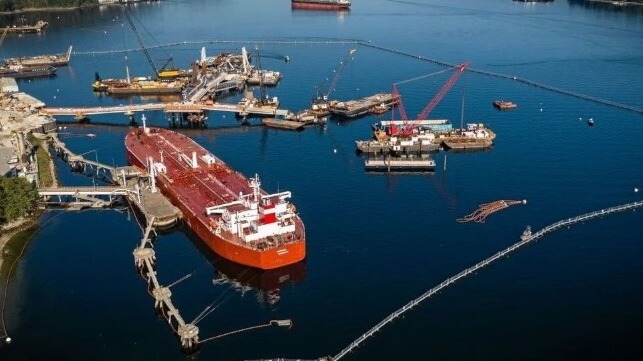First Tanker for Trans Mountain Pipeline Arrives in Vancouver

On Monday, the tanker Dubai Angel arrived at the Westridge Marine Terminal in Vancouver, B.C., the seaward terminus of the Trans Mountain Pipeline (TMX). The Dubai Angel is scheduled to load the first 550,000-barrel cargo of Albertan tar sands crude from the TMX, marking the beginning of a new chapter for Canadian producers.
The TMX has been in development for 12 years, and has survived multiple challenges, cost overruns and shifting political winds. Environmental and indigenous groups opposed its construction, and the Canadian federal government bought out original owner Kinder Morgan in 2018 in order to ensure that it could be completed for Albertan oil producers. Under government management, the price of construction soared to US$9 billion in 2020, then US$15 billion by 2022. The final as-built price for Canadian taxpayers came in at about US$23 billion.
The pipeline is a paradigm shift for the tar sands industry. Without domestic access to the sea, Canadian heavy crude had to be sold into the U.S. market, or to international buyers via U.S. pipelines. This gave American refiners leverage on pricing, and Canadian producers had few alternative options. Now that TMX has begun commercial operations, producers like Suncor can market their output to customers in China, without paying the cost of pipeline shipment to the U.S. Gulf Coast. Since February, Alberta's benchmark Western Canadian Select blend has been trading for about eight percent more than West Texas Intermediate, reversing a longstanding trend.
Earlier this month, Suncor said that it would be leasing ships like the Dubai Angel itself and selling the oil directly to buyers, without going through a trader. “We’re well-positioned to deliver volumes to our customers and remove that middleman and capture the full value for Suncor,” EVP Dave Oldrieve told analysts on a conference call.
There is one limitation for this promising new trade. Only Aframaxes can make the transit to and from the Westridge loading pier, so cargoes will be limited to about 600,000 barrels per vessel. This means that the terminal will need to load about one tanker every day to keep up with the TMX pipeline's capacity. The demand signal for an extra tanker every day should have a meaningful impact on the global Aframax market, according to analysts Poten & Partners. These smaller ships will be needed for short-haul runs to the U.S. West Coast, long-haul trips to Asia, and local lightering operations to fill up larger VLCCs.
No comments:
Post a Comment